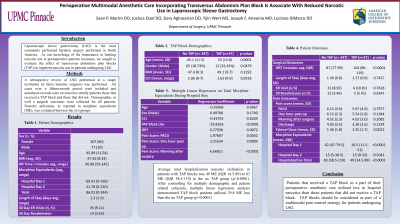General Surgery
Perioperative Multimodal Anesthetic Care Incorporating Transversus Abdominis Plan Block Is Associate With Reduced Narcotic Use in Laparoscopic Sleeve Gastrectomy

Has Audio
Introduction/Purpose: Laparoscopic sleeve gastrectomy (LSG) is the most commonly performed bariatric surgery performed in North America. As our knowledge of the importance in limiting narcotic use in postoperative patients increases, we sought to evaluate the effect of transversus abdominis plan blocks (TAP) on inpatient narcotic use in patients undergoing LSG.
Methods or Case Description: A retrospective review of LSG performed at a single institution by three bariatric surgeons was performed. All cases over a fifteen-month period were included and anesthesia records were reviewed to stratify patients those that received a TAP block and those that did not. Demographic, as well a surgical outcomes were collected for all patients. Narcotic utilization, as reported in morphine equivalents (ME), was evaluated between the two groups
Outcomes: 384 LSG patients were identified of which 37 (9.6%) received a TAP block. There was no statistically significant difference in postoperative morbidity, length of stay or readmission between groups. Average total hospitalization narcotic utilization in patients with TAP blocks was 49 ME (IQR 14.5-89) to 83 ME (IQR 58.5-110) in the no TAP group (p < 0.0001). After controlling for multiple demographic and patient related cofactors, multiple linear regression analysis demonstrated TAP block patients utilized 29.8 ME less than the no TAP group (p < 0.0001).
Conclusion: Patients that received a TAP block as a part of their perioperative anesthetic care utilized less in hospital narcotics than those patients that did not receive a TAP block. TAP blocks may be a useful pain control adjunct in patients that undergo LSG.
Methods or Case Description: A retrospective review of LSG performed at a single institution by three bariatric surgeons was performed. All cases over a fifteen-month period were included and anesthesia records were reviewed to stratify patients those that received a TAP block and those that did not. Demographic, as well a surgical outcomes were collected for all patients. Narcotic utilization, as reported in morphine equivalents (ME), was evaluated between the two groups
Outcomes: 384 LSG patients were identified of which 37 (9.6%) received a TAP block. There was no statistically significant difference in postoperative morbidity, length of stay or readmission between groups. Average total hospitalization narcotic utilization in patients with TAP blocks was 49 ME (IQR 14.5-89) to 83 ME (IQR 58.5-110) in the no TAP group (p < 0.0001). After controlling for multiple demographic and patient related cofactors, multiple linear regression analysis demonstrated TAP block patients utilized 29.8 ME less than the no TAP group (p < 0.0001).
Conclusion: Patients that received a TAP block as a part of their perioperative anesthetic care utilized less in hospital narcotics than those patients that did not receive a TAP block. TAP blocks may be a useful pain control adjunct in patients that undergo LSG.
- SM
Sean Martin, DO
Resident
UPMC Pinnacle
Harrisburg, PA, US
